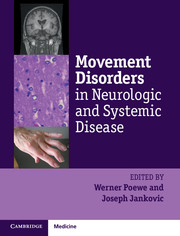Book contents
- Frontmatter
- Contents
- List of contributors
- List of videos
- List of abbreviations
- Preface
- Section I General principles
- Section II Movement disorders in systemic disease
- Section III Iatrogenic and toxic movement disorders
- Section IV Movement disorders in general neurology
- Chapter 17 Movement disorders in stroke
- Chapter 18 Movement disorders in multiple sclerosis
- Chapter 19 Movement disorders in neoplastic brain disease
- Chapter 20 Movement disorders in encephalitis
- Chapter 21 Sleep-related movement disorders
- Chapter 22 The borderland between epilepsy and movement disorders
- Chapter 23 Movement disorders associated with neuromuscular disorders and peripheral neuropathies
- Section V Systemic complications of movement disorders
- Index
- Plate Section
- References
Chapter 20 - Movement disorders in encephalitis
from Section IV - Movement disorders in general neurology
Published online by Cambridge University Press: 05 April 2014
- Frontmatter
- Contents
- List of contributors
- List of videos
- List of abbreviations
- Preface
- Section I General principles
- Section II Movement disorders in systemic disease
- Section III Iatrogenic and toxic movement disorders
- Section IV Movement disorders in general neurology
- Chapter 17 Movement disorders in stroke
- Chapter 18 Movement disorders in multiple sclerosis
- Chapter 19 Movement disorders in neoplastic brain disease
- Chapter 20 Movement disorders in encephalitis
- Chapter 21 Sleep-related movement disorders
- Chapter 22 The borderland between epilepsy and movement disorders
- Chapter 23 Movement disorders associated with neuromuscular disorders and peripheral neuropathies
- Section V Systemic complications of movement disorders
- Index
- Plate Section
- References
Summary
Introduction
Almost every infectious agent has the theoretical capacity to invade brain tissue as long as it manages to penetrate the blood-brain barrier. This might occur during viremia or bacteremia by active transmigration through the blood-brain barrier or via direct access to the CSF space in conditions of CSF leakage following, for example, neurosurgical procedures or open traumatic brain injury. While meningitis usually does not affect brain tissue – unless there is concomitant meningovasculitis which may give rise to ischemic strokes – the neurological syndromes of encephalitis are to a large part determined by potential anatomical predilection for sites of brain involvement of the different causative pathogens.
This chapter deals with encephalitides of various origin in which movement disorders have been described either as typical hallmarks or as potential or even rare manifestations of CNS inflammation. It will not deal with paraneoplastic encephalitides or involvement of the brain in autoimmune diseases (see Chapters 5 and 6). Neither will it deal with movement disorders in systemic infection, in particular, not with movement disorders in HIV infection (see Chapters 7 and 8).
Information
- Type
- Chapter
- Information
- Movement Disorders in Neurologic and Systemic Disease , pp. 293 - 313Publisher: Cambridge University PressPrint publication year: 2014
References
Accessibility standard: Unknown
Why this information is here
This section outlines the accessibility features of this content - including support for screen readers, full keyboard navigation and high-contrast display options. This may not be relevant for you.Accessibility Information
- 1
- Cited by
